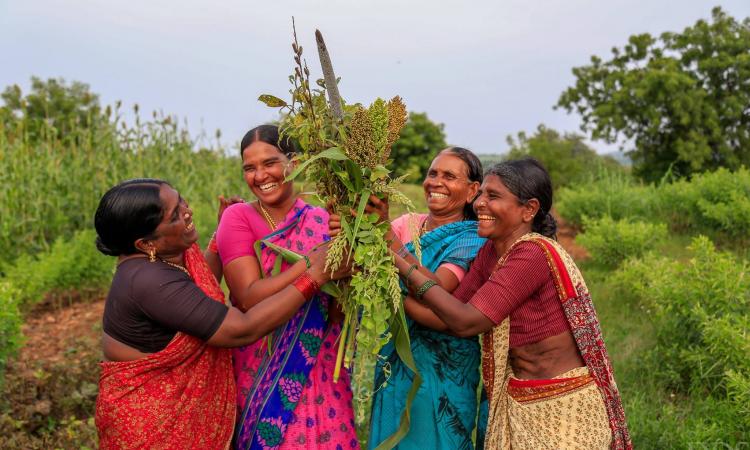
There is a disquieting hush across the world as the linkage between the planet’s health and human well-being became pronounced during the times of the pandemic. The deepening socio-economic and ecological crises caused by patterns of production and consumption are being increasingly recognised.
“The recovery plan by governments to deal with the health and economic impacts of COVID-19 should not be premised on ‘business as usual’ but on alternative approaches that are sustainable and integrate ecological protection with tackling inequality,” says Ashish Kothari, Founder-member of Kalpavriksh, Pune.
Kothari was speaking at a webinar on ‘Eco-swaraj: Towards a rainbow recovery for justice and sustainability’ co-organised by the Impact and Policy Research Institute and India Water Portal as a part of the #PlanetTalks series: The state of the environment.
He spoke about the renewed debates by the political mainstream in Europe and in US such as the one proposed by Bernie Sanders, democratic presidential contender - the decade of the Green New Deal (GND) that proposes decarbonisation. Government and industry are expected to move towards a reset to build a sustainable, inclusive economy, revitalise industry and preserve vital biodiversity systems as per the GND.
“The move that considers pathways to a more just, sustainable future considers the climate and employment crises at the centre of economic recovery,” says Kothari.
Eco-swaraj or radical ecological democracy
Kothari shared the need to build on the emerging concept of ‘Eco-swaraj’ or radical ecological democracy considering that COVID-19 has brought us at a critical political, economic and ecological juncture in our history.
“The current model of development has put a strain on ecological resilience; endangered natural resource-based livelihoods and has produced glaring poverty and economic inequalities. The top 8 billionaires in the world have wealth equivalent to 50% of the world’ population, while the richest 20% have 83% of the world’s income. We are rapidly approaching a tipping point as violence against nature, communities and cultures is on the rise. COVID-19 and the related global crisis have provided an excuse for more authoritarian and corporate profits, or opportunity for systemic transformation towards justice, equity and sustainability,” says Kothari.
Resistance to statist, capitalist, patriarchal, casteist and human-centred worldviews are part of the fundamental rethinking of the human project and the search for sustainable and equitable alternatives. Eco-swaraj can draw lessons from many grassroots initiatives and diverse strands of resistance that have sprung up in South Asia and the rest of the world.
Kothari shared the example of Deccan Development Society in Sangareddy district of Telangana where thousands of women struggling with food security problem collectivised to form sanghams, or self-help groups. They came up with solutions by reviving traditional crops such as millet, pulses, oilseeds and wild greens suited to the area.
They are now working on securing women’s land rights, reviving traditional agricultural diversity/ practices (millets), doing organic farming and creating community grain banks. The sangham members helped the poor and marginalized sections brave the coronavirus lockdown by donating 20,000 kilograms of grains to supply nutritious millet porridge in the villages.
Kothari discussed an initiative from Gadchiroli, Maharashtra called the ‘Maha Gramsabha’ that provides an alternative vision of direct democracy in the region. The federation of 90 villages has been working on stopping mining, sustainable livelihoods, forest rights and conservation, local governance, women’s empowerment and cultural identity.
The residents' collectives of Bhuj in western Gujarat that come up with their own plans to manage waste and drinking water are yet another example of trying to make a dent in entrenched institutions and mindsets. “The work supported by Homes in the City covers water self-reliance, solid waste management, sanitation, re-commoning of spaces, livelihoods and dignified housing of poor,” says Kothari.
Embracing radical ecological democracy would require amplifying such efforts whose relevance has been amply demonstrated during the pandemic.
A rainbow recovery
There are several debates on the policy responses necessary to recover and more broadly on what a post-COVID world should look like. Kothari suggested the need to embrace a recovery that is not just based on restricted notions of green or red but is multi-coloured and founded on creating dignified livelihoods, protecting nature, ensuring justice for all, and reviving solidarity.
This new framework would learn from local indigenous peoples territorial struggles and notions of well-being from India and other parts of the world and would be constructed on strong ethical foundation degrowth, commons, solidarity economy, biocivilisation, ecosocialism and ecofeminism.
With its strong democratic impulse, the rainbow recovery seeks to provide space to the most marginalised people in decision making. “Embracing radical ecological democracy will require achieving human well-being through empowering all citizens and communities to participate in decision-making. It would also need to ensure socio-economic equity and justice and respect the limits of the earth,” says Kothari.
“Substantial public investments coupled with serious wealth redistribution are needed as pointed out by economist Prabhat Patnaik - 2% wealth tax along with 33% inheritance tax on the richest 1% of India could generate more revenue than the total recovery package announced in May 2020. It would need substantial investments in public health, education, housing, transportation and other basic needs,” says Kothari.
The five values on which the transformation will be built are – radical democracy; economic democracy; social justice and well-being; culture and knowledge diversity; and ecological resilience and wisdom.